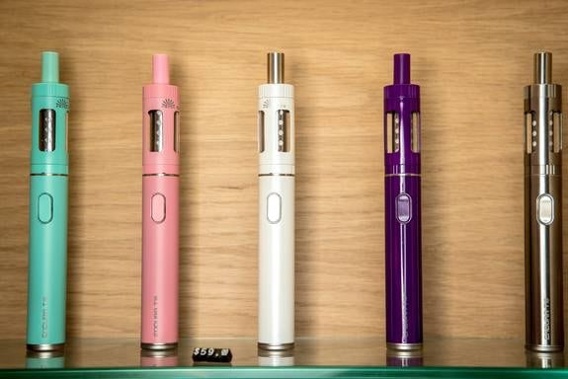
Retailers are encouraging users to stockpile disposable devices and are selling higher-strength vapes at a heavy discount ahead of a ban on some vape products.
Disposable vapes can no longer be sold from December 21 unless they follow new rules, including maximum nicotine limits, removable batteries, child safety features and new labelling requirements.
The same changes will be required for all vapes in March, and they will also be limited to generic flavours and banned from using images of toys or cartoons.
With popular products about to become illegal, many retailers are having a fire sale, with devices selling for as low as $2 and many being given away free with other products.
One of the largest retailers, Shosha, is advertising a range of “pre-ban disposables”.
“Don’t be left stranded without a vape,” says the website for another retailer, Vapourium, which was selling disposables at 60 per cent off. “Tuck one of these disposable vapes in your backpack and breathe a sigh of relief.”
“Stock up while you still can!” retailer Vapo said on its website about products which are soon to be illegal. “Get them before they’re gone!”
The Ministry of Health said it was aware of an increase in disposable vapes at reduced prices or being given away.
A spokeswoman said there were no restrictions on discounting vape products for specialist vape retailers, as long as they followed advertising rules. Only general retailers like dairies or petrol stations were banned from discounting.
The new regulations were designed to discourage young people from taking up vaping by targeting a cheap, readily available (and environmentally damaging) product.
A new survey released today by Action on Smoking and Health (Ash) showed the number of Year 10 students (14 and 15 year-olds) who vaped regularly had fallen for the second year in a row, to 16.4 per cent, while the number of daily vapers remained steady at 10 per cent. The organisation said this was encouraging but that vaping rates were still too high.
/cloudfront-ap-southeast-2.images.arcpublishing.com/nzme/FKIF23B5ZNG2RIKHSUS2LZK4Q4.jpg) Vaping supplies at a Vapo store on Karangahape Rd, Auckland. Photo / Michael Craig
Vaping supplies at a Vapo store on Karangahape Rd, Auckland. Photo / Michael Craig
Ben Pryor, director of retailer Vapo and the Alt NZ brand, said his company supported some of the regulations, such as the child-safety requirements.
But he felt other measures were based more on “knee-jerk politics” than evidence.
Pryor said the maximum nicotine strength of 20mg/ml was around a third of the nicotine found in a cigarette. This would make vaping products less effective as a smoking cessation tool, he said.
This concern was shared by Emeritus Professor Robert Beaglehole, chairman of Ash.
“They have got that completely wrong. For cigarette smokers who are transferring off the most harmful product, they need the substitute to provide the nicotine that they were getting from the cigarettes. Often that will require a much higher dose than the 20.
“In setting limits, we need to focus on the people we are most concerned about, which are adult confirmed smokers, two-thirds of whom are going to die from cigarette smoking.”
The 20mg/ml limit is in line with European Union limits and other jurisdictions. There will be a slightly higher limit for reusable vapes in New Zealand, at 28.5mg/ml.
Beaglehole acknowledged that politicians and health officials were trying to strike a balance between discouraging youth vaping while maintaining vaping as a way for adult smokers to quit.
While the latest round of regulations were “well-intentioned”, the industry had already moved on, he said. Many sellers had also created disposables which can take removable batteries, effectively circumventing the new regulations.
The regulation change also raised the problem of disposing of non-compliant vapes. Pryor said while his company was able to redirect disposable vapes to Australia, thousands of disposable products at other retailers would end up in landfills.
The ministry said it was the retailers’ responsibility to dispose of the products appropriately.
It would be paying visits to retailers after the cut-off date to check they were not still selling disposables, which is punishable by a fine of up to $400,000.
/cloudfront-ap-southeast-2.images.arcpublishing.com/nzme/YNFFSNU7JZBFPBXIYHSN4WBZRI.JPG)
Professor Janet Hoek, who specialises in smokefree policymaking, said the incoming regulations were an important step but did not address some of the key areas like widespread availability.
Vapes can no longer be sold near schools or marae, but this does not affect the thousands of sellers already operating nor general retailers like dairies or supermarkets.
Hoek, from the University of Otago, wanted vapes to be treated solely as therapeutic products and only sold by trained people in specialist stores who can help advise smokers to transition to vapes. She also wanted point-of-sale advertising banned and plain packaging introduced to deter young people.
The long-term health effects of vaping are not yet known. But Hoek said nicotine addiction alone was known to be harmful to young people, in particular by disrupting sleep and schooling.
The new National-led Government has indicated some changes to vaping, including harsher penalties for sales to under 18-year-olds, considering requiring sellers to hold a liquor licence, amending vaping product requirements and reforming vaping regulation.
Associate Health Minister and NZ First MP Casey Costello said she was still getting advice but she felt the vaping regulation changes so far were “tweaking around the edges” without making a significant impact.
She was reviewing the availability of vapes, where they could be sold and by whom, and whether they could be offered to smokers alongside other smoking cessation options like nicotine gum and patches.
Costello has also sought advice on whether oral nicotine and smokeless tobacco could be legalised in New Zealand as further anti-smoking measures.
Isaac Davison is an Auckland-based reporter who covers health issues. He joined the Herald in 2008 and has previously covered the environment, politics, and social issues.
Take your Radio, Podcasts and Music with you









